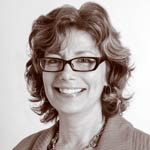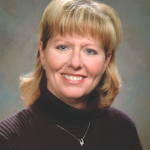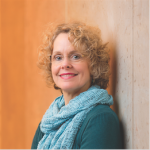 But when a technical-writer position became available at a small biomedical engineering company based in Houston, she leapt at the opportunity After only several months on the job, her boss approached her about filling in for the company’s trade-show manager, who was moving. Dossett was game, but she had a question first: What’s a trade show? Her boss pitched it as an opportunity to travel and to work with every department in the company, organizing exhibit-hall participation at 40 shows per year, all over the world.
But when a technical-writer position became available at a small biomedical engineering company based in Houston, she leapt at the opportunity After only several months on the job, her boss approached her about filling in for the company’s trade-show manager, who was moving. Dossett was game, but she had a question first: What’s a trade show? Her boss pitched it as an opportunity to travel and to work with every department in the company, organizing exhibit-hall participation at 40 shows per year, all over the world.
“I said, ‘All right, sign me up,’” Dossett said. She never looked back. Seventeen years later, Dossett is now president and owner of Conferences Designed, a Dallas-based meeting-planning company. She spoke with Convene about how she quickly took to the meeting-planning industry and eventually decided to hang out her own shingle:
I became fascinated as a large exhibitor at the shows — like how they were put together and how they were run. I very quickly realized it was the path I wanted to pursue. The company I had started with, in the meantime, after a few years, was bought out by a larger company. The office in Houston ceased to exist. I moved to Washington, D.C., to get involved with the association world. I learned the association side of trade shows through my job as the trade-show manager at the American Physical Therapy Association [APTA] and was there five years. Loved it.
But after that time, there weren’t a lot of growth opportunities. I was getting bored. I loved the association and the work that was going on; I just felt like I needed a change. I jumped into a director of meetings position at a very small association in D.C. I was there a year [on staff] and then did some contract work with them.
I think the idea [to strike out on my own] really hit about that time, because I started doing some contract work for a couple of different associations. I really enjoyed being able to come in, integrate, solve a problem, and be a part of the team. But I don’t think I was quite ready to jump into it wholeheartedly. After a couple of years of bouncing around and doing contract work, I really wanted to go back to an office full-time. I missed the camaraderie. I went to work full-time for almost four years at a nonprofit in Virginia as the director of meetings. As a part of their executive team, I became more involved in not only the day-to-day meeting planning from nuts to bolts, but also the business-management side of things — working side by side with the governance body, and learning more about the intricacies of association management. My involvement with PCMA assisted in honing those skills as well. Then I knew I was ready.
I knew from the beginning of going out on my own that it would be successful. But I didn’t know how long it would take or if there would be income. I had set aside money to live on for the first year. The stars really aligned in so many ways…. I put my house on the market and sold it within 24 hours. I moved three weeks later [back to Texas].
Both of my parents were successful entrepreneurs. I always had that in my blood. I credit both of my parents for my work ethic, and I know that is one of the reasons my business has been so successful so quickly; and my dedication to the client. Being able to figure out what they really need and find that niche.
[I had to relearn] how to be efficient working from home, because I hadn’t done that in a couple of years. The challenge is twofold. You don’t get that socialization every day from having lunch with your coworkers, or seeing people in the hall. On the positive side, I get so much more done, because you don’t have those interruptions. I am very organized, am a list maker, and I self-motivate. It works!
At the beginning of [starting my] business last spring, I had just moved to Dallas. I didn’t know a lot of people outside of my family. The thing I turned to is what I knew, which was PCMA. I went to chapter meetings and met a couple of people. One of my goals was to get the name of my business out there. And a challenge was being able to best articulate my business and why it stands out. PCMA allowed me that platform — a comfortable environment to teach myself how to talk about the business. And also, I just wanted new friends in the Dallas community! Then I joined a local networking group of women business owners and leaders. That has been fantastic. I found one or two clients through word-of-mouth in that group. I also found some great friends. Now I’m getting referrals.
I look at my core clients.There are a couple of corporate and association clients, and a large insurance company. I do a little bit of work for a marketing firm. But the majority of my current client base is medically oriented groups. I started in a biomedical engineering company and then at APTA Now, 10 or 15 years later, I’ve come full circle and most of my clients are in the medical field.
I love what I do. I really enjoy the details — my days as a technical writer right after college assisted me in editing and being able to adeptly review contracts, and I maintain a love for writing and editing to this day. I’m very good at and enjoy hotel contract negotiations. Those skills came naturally to me. My father always told me that I should be a lawyer because I loved to research and write. And I’m fair, to a fault.
I like working with many different people and learning about different jobs and industries. And I love [the bigger-picture aspects of meeting planning]. I have one client right now who has given me carte blanche to design a meeting for her. It’s coming to fruition later this year, and I can’t wait to see it. It’s a women’s empowerment retreat.
I think it’s important not to pigeonhole yourself into one type of experience. Be willing to jump to another segment of the industry. Get as much exposure as you can. Getting involved in committees and learning I think is very important — to make those contacts and make new friends.
Now I’m at the point where I need some help. I need to hire a few contract planners. I’m calling my independent meeting professional friends that are successful in the D.C. market, saying, hey, I need to hire someone. Are you available? Or, do you mind if I call someone that works for you that I know? They’re very supportive.
I really believe that how you treat people is so critical — my approach involves honesty, providing as much information up front as possible, and having a sense of thoroughness and calm. The nature of our business is details and adaptability. I’m particularly excited about new data — we have so much data at our fingertips now. It’s a matter of learning how to sort through and best utilize it.
Mentorship is very, very important to me, as is community service. I know we’re all so pressed for time, but I think it’s so important to give back to your communities. Find something you’re passionate about or involved in. I’m involved in two groups here in Dallas — one has to do with dogs and one is with a women’s shelter. If I were to narrow down what’s most important to me, I’d say giving back comes right after family.


